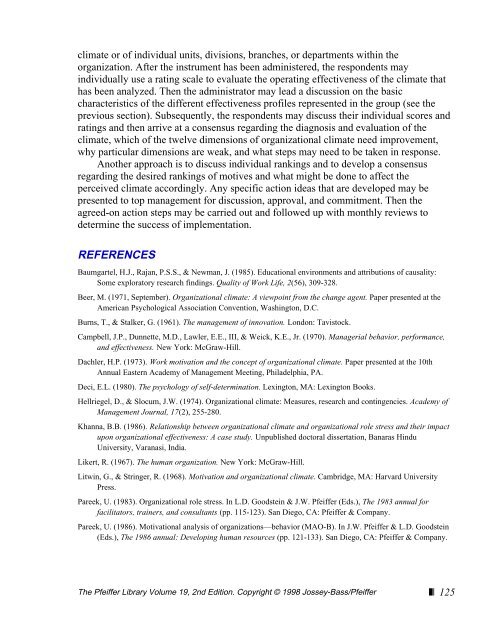motivational analysis of organizations
motivational analysis of organizations
motivational analysis of organizations
You also want an ePaper? Increase the reach of your titles
YUMPU automatically turns print PDFs into web optimized ePapers that Google loves.
climate or <strong>of</strong> individual units, divisions, branches, or departments within the<br />
organization. After the instrument has been administered, the respondents may<br />
individually use a rating scale to evaluate the operating effectiveness <strong>of</strong> the climate that<br />
has been analyzed. Then the administrator may lead a discussion on the basic<br />
characteristics <strong>of</strong> the different effectiveness pr<strong>of</strong>iles represented in the group (see the<br />
previous section). Subsequently, the respondents may discuss their individual scores and<br />
ratings and then arrive at a consensus regarding the diagnosis and evaluation <strong>of</strong> the<br />
climate, which <strong>of</strong> the twelve dimensions <strong>of</strong> organizational climate need improvement,<br />
why particular dimensions are weak, and what steps may need to be taken in response.<br />
Another approach is to discuss individual rankings and to develop a consensus<br />
regarding the desired rankings <strong>of</strong> motives and what might be done to affect the<br />
perceived climate accordingly. Any specific action ideas that are developed may be<br />
presented to top management for discussion, approval, and commitment. Then the<br />
agreed-on action steps may be carried out and followed up with monthly reviews to<br />
determine the success <strong>of</strong> implementation.<br />
REFERENCES<br />
Baumgartel, H.J., Rajan, P.S.S., & Newman, J. (1985). Educational environments and attributions <strong>of</strong> causality:<br />
Some exploratory research findings. Quality <strong>of</strong> Work Life, 2(56), 309-328.<br />
Beer, M. (1971, September). Organizational climate: A viewpoint from the change agent. Paper presented at the<br />
American Psychological Association Convention, Washington, D.C.<br />
Burns, T., & Stalker, G. (1961). The management <strong>of</strong> innovation. London: Tavistock.<br />
Campbell, J.P., Dunnette, M.D., Lawler, E.E., III, & Weick, K.E., Jr. (1970). Managerial behavior, performance,<br />
and effectiveness. New York: McGraw-Hill.<br />
Dachler, H.P. (1973). Work motivation and the concept <strong>of</strong> organizational climate. Paper presented at the 10th<br />
Annual Eastern Academy <strong>of</strong> Management Meeting, Philadelphia, PA.<br />
Deci, E.L. (1980). The psychology <strong>of</strong> self-determination. Lexington, MA: Lexington Books.<br />
Hellriegel, D., & Slocum, J.W. (1974). Organizational climate: Measures, research and contingencies. Academy <strong>of</strong><br />
Management Journal, 17(2), 255-280.<br />
Khanna, B.B. (1986). Relationship between organizational climate and organizational role stress and their impact<br />
upon organizational effectiveness: A case study. Unpublished doctoral dissertation, Banaras Hindu<br />
University, Varanasi, India.<br />
Likert, R. (1967). The human organization. New York: McGraw-Hill.<br />
Litwin, G., & Stringer, R. (1968). Motivation and organizational climate. Cambridge, MA: Harvard University<br />
Press.<br />
Pareek, U. (1983). Organizational role stress. In L.D. Goodstein & J.W. Pfeiffer (Eds.), The 1983 annual for<br />
facilitators, trainers, and consultants (pp. 115-123). San Diego, CA: Pfeiffer & Company.<br />
Pareek, U. (1986). Motivational <strong>analysis</strong> <strong>of</strong> <strong>organizations</strong>—behavior (MAO-B). In J.W. Pfeiffer & L.D. Goodstein<br />
(Eds.), The 1986 annual: Developing human resources (pp. 121-133). San Diego, CA: Pfeiffer & Company.<br />
The Pfeiffer Library Volume 19, 2nd Edition. Copyright © 1998 Jossey-Bass/Pfeiffer ❚❘ 125

















